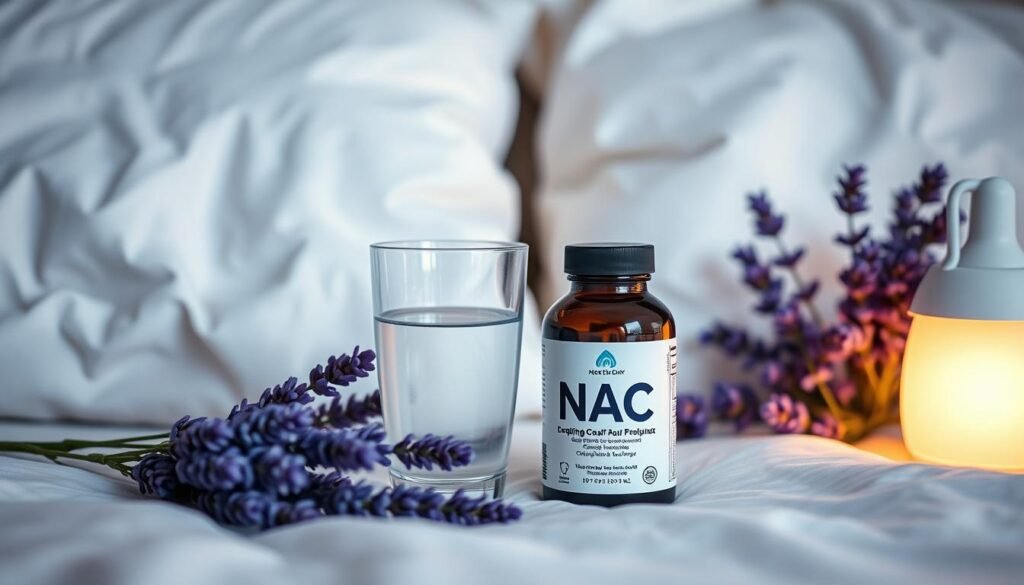Did you know over 70 million Americans face sleep issues like insomnia? This huge number shows a major health problem. It also makes us think about natural sleep helpers. N-acetylcysteine (NAC) is one such helper that’s getting noticed for its health benefits. These include potentially helping you sleep better.
By increasing glutathione levels, NAC might tackle insomnia’s root causes. This lets people sleep more deeply. Since sleep is key for mental health and wellness, it’s important to know how NAC aids better sleep.
Key Takeaways
- NAC has been shown to reduce oxidative stress, which can significantly affect sleep quality.
- This supplement may help improve daytime alertness and reduce sleep fragmentation.
- NAC supplementation could lead to significant improvements in overall sleep quality.
- A starting dosage of NAC typically ranges from 500 mg to 1000 mg for sleep-related issues.
- Gender differences in NAC response suggest specific timing for optimal effects on sleep.
Introduction to NAC and Insomnia
N-acetylcysteine (NAC) is becoming popular as a natural supplement for better sleep. It’s known for its antioxidant abilities, which fight oxidative stress affecting sleep. Studies suggest NAC could improve sleep by using its biochemical properties.
NAC helps move from glutamate to GABA, important for good sleep. It boosts glutathione production, aiding in sleep regulation. This makes it useful for those with insomnia.
NAC is a good choice for those wanting a natural sleep aid. It offers a safer option than many sleep drugs. Using NAC might lead to better sleep without drug dependency risks.
More studies on NAC suggest it could play a big role in healthy sleep. It shows promise for those looking to improve their rest and wellness.
To learn more about NAC and sleep, check out this detailed study. It covers how NAC works and its benefits for sleep issues.
Understanding Insomnia and Its Effects on Sleep
Insomnia is a sleep disorder that about one-third of adults in the U.S. experience. People often struggle with falling asleep, staying asleep, or waking up too early. These issues can hurt daily life and health.
Chronic insomnia can cause tiredness, mood swings, and trouble thinking clearly. Though one-third of people with insomnia symptoms may have insomnia, few get diagnosed or treated.
Insomnia can make it hard to sleep well. It increases the risk of depression and mood problems. The connection between insomnia and mental health is complex. This makes finding the right treatment hard. For example, half of those with depression in Singapore also had insomnia.
Cognitive behavioral therapy for insomnia (CBT-i) is the best treatment. It offers lasting help for many people. However, it can be hard to find trained therapists. So, there’s a growing need for other options, like sleep apps.
People with insomnia often feel more anxious and irritable. Sleeping well is crucial for managing emotions. Addressing sleep issues is important to avoid bigger mental health problems. Understanding the link between lack of sleep and emotions can be found here.
| Aspect | Statistics |
|---|---|
| Prevalence of Insomnia Symptoms | 1/3 of US adults |
| Meets DSM-5 Criteria | 1/3 of insomnia symptom sufferers |
| Diagnosed with Insomnia | 1/3 of those meeting criteria |
| Treated with Medication | 1/3 of diagnosed individuals |
| Links to Major Depressive Disorder | 50% with major depression |
The Role of NAC in Sleep Quality
N-Acetylcysteine, or NAC, is gaining attention because it may help with sleep. It plays a key role in making NAC and glutathione. These help fight oxidative stress in the body. Many people now use NAC to sleep better and improve their health.
How NAC Enhances Glutathione Production
Taking NAC can really boost your body’s glutathione levels. Glutathione is an important antioxidant. It protects cells from damage and keeps you healthy. This can lead to less oxidative stress, which may improve your sleep quality. Those with sleep problems often have high oxidative stress. By increasing NAC and glutathione, it could help you sleep more soundly.
The Impact of NAC on Oxidative Stress
Oxidative stress is linked to many health issues, like bad sleep. Studies show taking NAC can lower oxidative stress. This makes sleep better. Using NAC might help you achieve deeper, more restful sleep. Adding NAC to your daily routine could improve your sleep and health a lot.
NAC and Insomnia: Bridging the Gap
About 40% of people with insomnia don’t find help with usual treatments. Studies show 3% to 5% of folks everywhere might have it. In fact, studies around the world show up to half of us may get insomnia at some point.
N-acetylcysteine (NAC) helps fight oxidative stress and can improve sleep. It helps those with insomnia look at their condition in a new way. Scientists have found that people with insomnia often feel more anxious and sad. They also have different brain activity compared to those without sleep issues.
The role of NAC in treating insomnia is key. It helps make glutathione, which fights oxidative stress, and boosts sleep quality. Poor sleep can affect your mental health, leading to more insomnia. NAC could offer a natural way to sleep better and feel better emotionally.

| Study Group | Pittsburgh Sleep Quality Index (PSQI) Score | Anxiety Level (SAS) | Depression Level (SDS) | Years of Education |
|---|---|---|---|---|
| Control Group | 4.29 ± 2.05 | 29.75 ± 7.41 | 17.14 ± 11.15 | 13.64 ± 2.97 |
| Insomnia Group | 13.62 ± 3.56 | 53.04 ± 10.12 | 46.00 ± 9.61 | 9.65 ± 3.73 |
This table shows big differences in mental health and schooling between folks with and without insomnia. It shows why we need treatments like NAC.
Biochemical Mechanisms of NAC in Sleep Regulation
NAC’s link to sleep involves complex chemical actions that affect brain chemicals. It helps us understand how NAC might make our sleep better.
The Shift from Glutamate to GABA
Lack of sleep can be due to an imbalance between glutamate and GABA. Glutamate wakes the brain up, while GABA calms it down. NAC helps switch from glutamate to GABA, which starts the sleep process.
By boosting GABA in the brain, NAC helps us relax and sleep easier.
NAC’s Effect on Melatonin Secretion
NAC also plays a role in how melatonin, the sleep hormone, works. Melatonin controls our sleep cycle, helping us rest better. NAC helps keep melatonin levels balanced to improve sleep.
Studies show certain brain activities trigger deep sleep. Activating specific neurons in the brain increases deep sleep time. This research points to new ways we could help people sleep better.
For more info, visit the research article.
Influencing Sleep Latency with NAC
Sleep latency defines how long it takes to fall asleep. Many things impact this time, like stress and health. NAC could help in shortening this period. Studies show that NAC may ease the journey to sleep.
N-acetylcysteine (NAC) is crucial for balancing brain chemicals. It reduces brain stress and balances sleep-important chemicals. This means NAC could make falling asleep easier, helping especially those with sleep troubles. Research connects better sleep onset to enhanced sleep health.

People with insomnia may have different brain patterns. These patterns could make falling asleep hard. NAC might offer a natural way to adjust these patterns, aiding sleep onset.
Research continues to explore how improving sleep latency with NAC can lead to enhanced sleep architecture, ultimately benefiting mental health and overall well-being.
Exploring the Research Behind NAC and Sleep
Recent studies highlight how NAC may help with better sleep. Both animals and humans have been part of this research. These studies aim to show NAC as a natural option for improving sleep.
Animal Studies on NAC and Sleep Drive
Animal research gives clues on NAC’s impact on sleep. It seems to boost the need to sleep, making rest more fulfilling. This sparks interest in using NAC to enhance sleep for many people.
Human Trials and Their Findings
Human studies on NAC show encouraging results too. People taking NAC experienced better sleep, especially those with lasting insomnia. These trials are uncovering how NAC helps achieve deeper sleep and fewer wake-ups at night. This points to its value in treating sleep issues.
The Safety and Efficacy of NAC as a Natural Supplement
N-Acetylcysteine (NAC) is known for possibly improving sleep quality. It’s seen as safe for adults when taken correctly. Many studies have looked into how it helps with sleep.
Dosage Recommendations for Adults
Adults often take 600 to 1,200 mg of NAC daily. This dosage comes from research on its effectiveness and safety. Following these guidelines helps avoid risks and get the most benefit.
Possible Side Effects and Precautions
NAC is safe for most, but some might experience side effects. These can include stomach upset or nausea. Up to 23% of people might face these issues.
In rare cases, serious issues like low blood pressure or asthma attacks can occur. Talking to a doctor first is smart, especially if taking other meds or having health concerns. This ensures using NAC safely.

Integrating NAC with Other Natural Supplements for Sleep
Combining N-acetylcysteine (NAC) with other natural supplements helps improve sleep. This method focuses on amino acids and antioxidants. They are key in promoting deep sleep. Using amino acids for sleep can regulate brain chemicals leading to better sleep patterns.
The Role of Amino Acids and Antioxidants in Sleep Health
Amino acids like tryptophan and glycine boost serotonin and melatonin. These hormones help you fall asleep and stay asleep. Adding supplements with these amino acids to NAC can enhance sleep aid effectiveness. Antioxidants, such as vitamins C and E, fight stress on a cellular level to support sleep. Highlighting the advantages of supplement combinations offers a comprehensive way to tackle sleep issues.
Combining NAC with Behavioral Changes for Better Results
Mixing behavioral changes for sleep improvement with NAC boosts the effects. Stress management techniques and exercise are key. Establishing a calming bedtime routine and choosing healthy habits are crucial for better sleep. These techniques, alongside NAC, promote better sleep outcomes. Considering practical advice and resources like natural sleep aids and home remedies enriches your sleep plan.
Conclusion
The study of NAC for insomnia is promising. It shows that NAC helps improve sleep by working as an antioxidant. It also becomes glutathione, fighting the oxidative stress that disturbs sleep.
NAC helps balance our sleep by reducing excitatory neurotransmitters and increasing inhibitory ones. This leads to better sleep architecture.
Research shows NAC can make us fall asleep faster and enhance our sleep pattern. These studies involve animals and humans alike. They suggest that NAC could be a helpful sleep aid. It is more effective when combined with good lifestyle practices, like managing stress.
With these findings, everyone should know more about NAC as a potential sleep aid. It doesn’t just improve sleep quality. It can also boost overall health in a bigger picture. This broad application offers hope to those suffering from chronic insomnia.